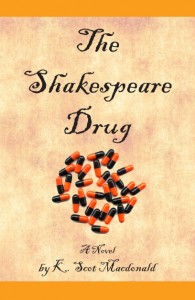K. Scot Macdonald is the author of two non-fiction books, as well as several articles in journals and magazines, including the Writers’ Journal and The Fletcher Forum of World Affairs. He has edited medical research grant proposals and articles that have appeared in a range of medical journals from Cancer Research and Biodrugs to The Journal of Pharmacology and Experimental Therapeutics.
 In Macdonald’s debut novel, The Shakespeare Drug, Los Angeles neurosurgeon Julie Stein, who is leading Alzheimer’s disease researcher, discovers the key to her long-frustrated dream of becoming a novelist: a combination of drugs that allows her to write as well as Shakespeare. Unfortunately, the drugs’ side effects may kill her. The high school football team is about to cut Julie’s son, Pete, who dreams of playing middle linebacker in the NFL. He is a little too small and a little too slow. Knowing the costs, he secretly starts taking anabolic steroids. Julie soon faces an awful choice: give up her dream or risk both their lives?
In Macdonald’s debut novel, The Shakespeare Drug, Los Angeles neurosurgeon Julie Stein, who is leading Alzheimer’s disease researcher, discovers the key to her long-frustrated dream of becoming a novelist: a combination of drugs that allows her to write as well as Shakespeare. Unfortunately, the drugs’ side effects may kill her. The high school football team is about to cut Julie’s son, Pete, who dreams of playing middle linebacker in the NFL. He is a little too small and a little too slow. Knowing the costs, he secretly starts taking anabolic steroids. Julie soon faces an awful choice: give up her dream or risk both their lives?
Where did you get the idea for The Shakespeare Drug?
I was struck by how often athletes, who are encouraged and showered with glory when they win, are pilloried when they take performance-enhancing drugs to improve. As a writer, I wondered how society would react if a drug became available to enable people to write like Shakespeare, paint like Monet or conduct science on the level of Einstein, but with dangerous side effects. Would the health risks of such drugs be acceptable? Society seems to have a love-hate relationship with sports: worshipping athletes, yet at the same time not really valuing their achievements. Would the same view apply to literature, painting or science?
Is Alzheimer’s really related to creativity?
In the novel I mention how critics panned British writer Iris Murdoch’s 26th novel. She had won a Man Booker prize and was a celebrated novelist. Later it turned out that she was in the early stages of Alzheimer’s, which does harm creativity by making it harder to express abstract thoughts and—crucial for a writer—shrinks vocabulary.
How did you research the medical aspects of The Shakespeare Drug?
I have worked as a writer—a grant writer and writing website content—at a major medical center for more than a decade. I probably know just enough medicine to be dangerous. I’ve observed several neurosurgical procedures and my brother is chair of neurosurgery at a hospital in Toronto, so that helped with the details and feel for Mount Herman Medical Center in The Shakespeare Drug. Research in medical journals supplied some of the key specific details related to Alzheimer’s disease.
Part of the novel is set in the world of high school football. Did you play football in high school?
At 5’ 7” and 120 pounds, I wouldn’t be here today if I’d played football. I did play golf on my high school’s team, as well as flag football, soccer, lacrosse, hockey, tennis, basketball and swimming competitively in community leagues. Those experiences gave me insight into some of the feelings high school athletes have for their sport: the drive and feeling of how important it is. When I was 13, I suffered a concussion playing hockey in a playoff game and I begged my mother to let me play the following week, against doctor’s orders. That game was the most important thing in my life at that time. My father was a sportswriter, which also provided some perspective on sports.
Did you base your heroine, Dr. Julie Stein on someone you’ve worked with?
Female neurosurgeons are extremely rare and the hospital where I work has none, at least when I worked there. Dr. Julie Stein is based on some women I’ve known: my sister and my sister-in-law the most. They are both confident, successful women who set goals and achieve them, yet also at times show sudden lack of faith in themselves, which surprises me.
Have you always wanted to be a novelist?
I remember a photograph my parents had of me perched on five Encyclopedia Britannica volumes, pecking away at an ancient manual typewriter at a desk when I couldn’t have been older than ten. I have always wanted to be a writer, and as I tried different forms—short stories, scriptwriting, plays and novels—I found that I enjoyed writing novels the most. They allow for the most insight into characters and exploration of themes.
What was the most surprising part of the writing process?
I started out liking to write, to put words together. Story was secondary. Every time I write a novel, it reminds me, forcefully, how much story and character must be paramount. You can string words together into sentences as perfectly as a Hemingway, Faulkner or even Shakespeare, but if the story lags or the characters aren’t engaging and they don’t carry the reader along, it will fail as a novel. Somerset Maugham argued the same idea in his Ten Novels and Their Authors: the first requirement of a novel is to entertain, and to entertain a novel must tell a gripping, emotional story involving engaging, believable characters.
What authors, books or ideas have influenced you?
Having written a novel called The Shakespeare Drug, I have to say Shakespeare. His phrasing and assembling of words into powerful, dramatic images is unmatched. For plot, Lajos Egri’s masterful work, The Art of Dramatic Writing taught me the importance of a novel having a thematic purpose, which is driven by a well constructed set of characters created for the theme’s purpose.
What are you reading now?
I tend to read older novels that are still read or books highly recommended by friends. It’s always such a disappointment when, after reading a novel for several hundred pages you realize it wasn’t worth the time. I recently read Robert Louis Stevenson’s Kidnapped, which is a masterful adventure story, and, more recently, Edith Wharton’s The House of Mirth, which has wonderful characterizations. Yann Martel’s Life of Pi I also enjoyed.
I am writing a novel related to justice about an honest man facing the 2008 economic crisis. For all our emphasis on the law and courts, we seem to have mixed justice up with deterrence, punishment and rehabilitation to the point that justice rarely, if ever, even gets mentioned in political discourse about crime and punishment. If you say something isn’t fair, you’re made to sound as if you’re a petulant five-year-old, not commenting on something that every society that survives must seek to be: fair.

